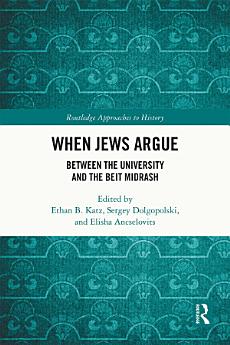When Jews Argue: Between the University and the Beit Midrash
About this ebook
The chapters then follow the approaches through an interdisciplinary series of pioneering case studies that reassess a range of topics including religion and pluralism in Jewish education; pain, sexual consent, and ethics in the Talmud; the place of reason and devotion among Jewish thinkers as diverse as Moses Mendelssohn, Jacob Taubes, Sarah Schenirer, Ibn Chiquitilla, Yair Ḥayim Bacharach, and the Rav Shagar; and Jewish law as a response to the post-Holocaust landscape. The authors are scholars of rabbinics, history, linguistics, philosophy, law, and education, many of whom also have traditional religious training or ordination.
The result is a book designed for learned scholars, non-specialists, and students of varying backgrounds, and one that is sure to spark debate in the university, the Beit Midrash, and far beyond.
About the author
Ethan B. Katz teaches History and Jewish Studies at the University of California, Berkeley. His previous books include The Burdens of Brotherhood: Jews and Muslims from North Africa to France (2015) and Secularism in Question: Jews and Judaism in Modern Times (2015, co-edited with Ari Joskowicz).
Sergey Dolgopolski is Gordon and Gretchen Gross Professor of Jewish Thought in the University at Buffalo SUNY. He has written Other Others: The Political After the Talmud (2018); The Open Past: Subjectivity and Remembering in the Talmud (2012); and What is Talmud? The Art of Disagreement (2009).
Elisha Ancselovits teaches at the Pardes Institute of Jewish Studies and Yeshivat Maale Gilboa and is a fellow at Emory University’s Center for the Study of Law and Religion. He has published widely in English and Hebrew and is completing a multi-volume history of Judaism through the lens of Jewish Law.




